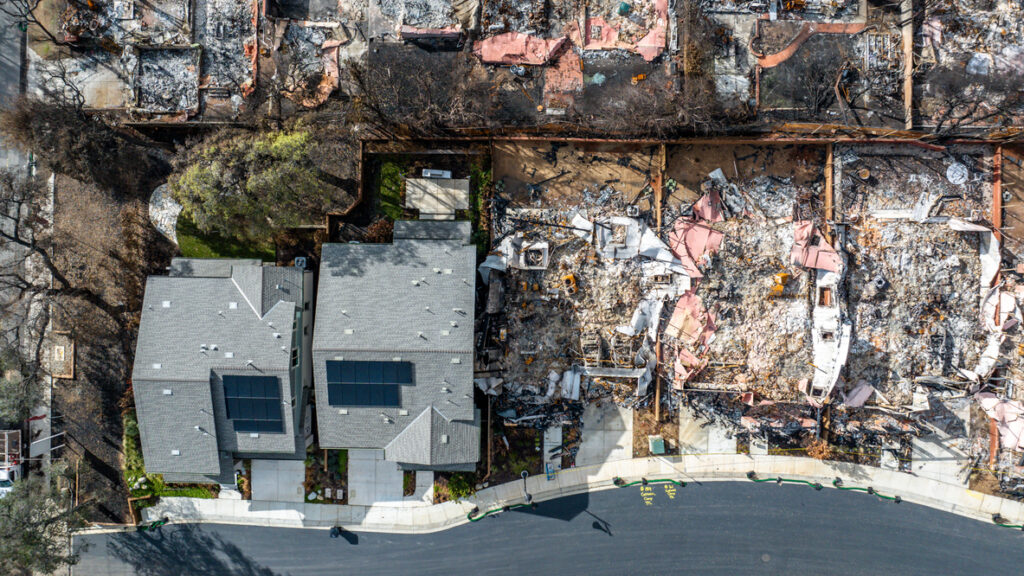FOR IMMEDIATE RELEASE
Contact: lppipress@luskin.ucla.edu
UCLA Study Finds Altadena’s Renters, Latinos, and Low-Wage Workers Face Barriers in Recovery
LOS ANGELES (May 22, 2025) — Altadena, the site of recent wildfires, is home to generations of working families, renters, immigrants, and small business owners who have long kept the community vibrant. A new data brief from the UCLA Latino Policy and Politics Institute and the Center for Neighborhood Knowledge reveals that these residents, many of whom lived paycheck to paycheck before the Eaton Canyon Fire, may face additional hardships during the recovery. Despite high overall income levels in Altadena, one in four households earned less than $65,000 a year, and Latino families were likely among the most impacted by rising rents, food insecurity, and housing instability even before the disaster.
The new publication is the latest in our ongoing series of wildfire briefs examining the socioeconomic impacts of wildfires across California.
Authored by Paul M. Ong, Gabriella Carmona, Silvia González, and Jonathan Ong and using the most recently available data, the brief reveals stark economic gaps: while one in four households had $250,000 or more in 2019-23, another quarter earned less than $65,000. Over 7,000 residents (18%) lived below twice the Federal Poverty Line (FPL), and Latino residents were disproportionately represented among the poorest households, making up 44% of those below the FPL despite making up 27% of the population.
Drawing from multiple publicly available datasets from the American Community Survey, Los Angeles County Department of Public Social Services, California Department of Education data, and Internal Revenue Service data, the data brief highlights the following key vulnerabilities:
- Economic Struggle Pre-Fire: In 2019-23, an annual average of over 7,000 Altadena residents (18%) had incomes below twice the Federal Poverty Line (FPL), with over 3,000 (7%) below the FPL, indicating significant financial vulnerability before the Eaton Canyon Fire.
- Disproportionate Latino Representation: Latino residents, 27% of Altadena’s population, made up 44% of those living below the FPL.
- Reliance on Safety Net Programs: In December 2024, over 2,700 Altadena residents relied on CalFresh, and 6,800 were enrolled in Medi-Cal before the fire.
- High Housing Cost Burden: During 2019-23, 28% of renters and 14% of homeowners in Altadena were severely cost-burdened, spending half or more of their income on housing.
- School-Based Support for Students: In the 2023-24 school year, 54% of Altadena’s 2,353 students were eligible for free or reduced-price lunches, with two schools in the fire’s burn zone and two others at risk of smoke damage.
“These findings reveal the economic gaps masked by Altadena’s affluent reputation, and show that thousands of residents—particularly low-income, Latino, and rent-burdened households—faced significant challenges even before the fire,” said Ong.
The report paints only a pre-fire picture of Altadena’s hidden economic vulnerabilities; significant data gaps remain that limit our understanding of who has been most affected by the January 2025 Eaton Canyon Wildfire. To address these gaps, the report recommends the County work with local universities to produce more geographic analysis of displacement, post-fire recovery snapshots, an inter-agency data collaborative, and targeted programs like affordable housing support and school meal stipends to address immediate needs and prepare for future wildfires.
“We must act swiftly to ensure recovery efforts prioritize those most in need,” Carmona added. “This data brief is a crucial first step in highlighting the challenges facing the Altadena community. But it’s just the beginning – we must work together to turn this data into an equity-centered roadmap for targeted rebuilding in Altadena. It’s our collective responsibility to improve outcomes for those most affected today and to document the lessons that can guide recovery in other wildfire-prone communities.”
The full data brief is available here.
About UCLA Latino Policy and Politics Institute:
The UCLA Latino Policy and Politics Institute is a non-partisan research institute that seeks to inform, engage, and empower Latinos through innovative research and policy analysis. LPPI aims to promote equitable and inclusive policies that address the needs of the Latino community and advance social justice. latino.ucla.edu.













